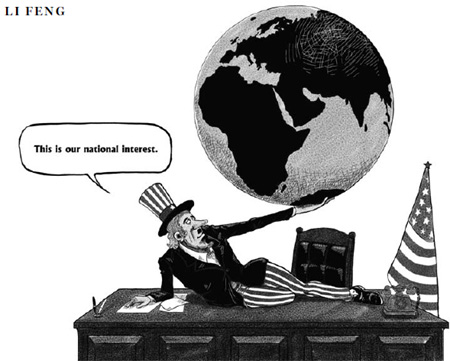International ties
US should stop meddling in Asian issues
By Wang Hui (chinadaily.com.cn)
Updated: 2010-07-29 14:59
 |
Large Medium Small |
Evidence abounds that the Obama administration is seeking a bigger role in Asia, which marks a visible departure from the Bush era. A string of major happenings recently all point to the same direction, that Washington is shifting its strategic focus to a region that was largely ignored by the previous Bush administration.
In spite of strong opposition from countries including China, the first round of the massive US-led joint military exercises with South Korea was concluded on Wednesday. The blatant show of force will be staged once a month throughout the year. With a naked intention to deter North Korea, the US-led military maneuver does serve as a double-edged sword as China soberly feels it as a threat.
Apart from this high-sounding military muscle flexing, US Secretary of State Hillary Clinton's recent visit to Asian countries also amounts to a manifesto of the fact that the US is making a bold comeback to Asia's regional affairs. In an apparent attempt to fan anti-China sentiments among the country's smaller Asian neighbors, Clinton chose the ASEAN Regional Forum to flaunt the US' open support of nations that have territorial disputes with China over the South China Sea. The US meddling of the South China Sea issue is widely perceived as another move to provoke China's interests.
It may be too early to predict whether the US strategic shift will usher in a reshuffle of powers in a region that is thriving to be a dynamic economic powerhouse in the world economic landscape. Nonetheless, it is certain that a bigger presence of Washington in Asia's regional affairs will inevitably disrupt the current political and strategic equilibrium.
As the biggest power in the Asia-Pacific region, China should remain vigilant against this new trend as it will unavoidably bear the brunt of the US strategic shift. One immediate result of the US meddling is that China's external environment will deteriorate, which will be detrimental for the country's social and economic development.
On the other hand, there seems to be a worrying phenomenon that the US intent to assume a bigger role in Asia plays into the hands of some Asian people who see a threat in China's growing influence in regional and world arenas. They pin high hopes on the US to counterbalance China's clout in the region. If so, these people should be told that they are opening the door to a dangerous new member to the Asian community.
Any solution to regional issues and disputes must be handled by Asians themselves. History shows that foreign interference would only open up a Pandora's Box, threatening the region's peace and stability in the end.
|
 |